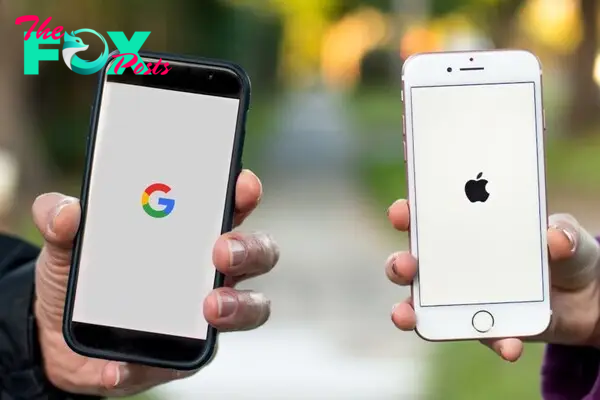Technology
Can an iPhone Track an Android: What You Need to Know

The idea of tracking an Android device using an iPhone might seem impossible, yet it’s a task that many people face for various reasons. Whether it’s about keeping an eye on a family member’s safety, recovering a lost phone, or monitoring a Business asset, the need for cross-platform tracking is real. However, navigating the differences between these two operating systems can be tricky. This post explores the solutions available, outlining how an iPhone can track an Android device and what steps to take to ensure the process is smooth, secure, and effective.
Can iPhone Track Android?
Yes, it’s possible for an iPhone to track an Android device, but it’s not as seamless as tracking another iPhone. The differences in operating systems create a few hurdles that you’ll need to overcome. But with the right tools and methods, it can be done.
To start, understanding the limitations is crucial. Unlike iPhones, which have a unified ecosystem, Android devices vary widely in software versions and manufacturer-specific features. This variability means that some tracking methods might work perfectly on one Android device and fail on another.
Here are a few key points to consider:
- Compatibility Issues: Not all apps work cross-platform. Make sure the app or method you choose supports both iOS and Android.
- Security Concerns: When tracking cross-platform, security can be a major issue. Sharing location data between different systems increases the risk of unauthorized access.
- App Permissions: Android’s permission settings might block certain tracking features. Ensure all necessary permissions are granted on the Android device.
While https://www.capriza.com/how-to-track-my-wifes-phone-calls-and-texts-for-free/ offers a broader view on monitoring, when it comes to tracking, a few reliable apps can get the job done.
However, it’s vital to respect privacy and ensure that tracking is done legally and ethically. Misuse of tracking tools can lead to serious consequences. So, if you’re considering this approach, weigh the pros and cons carefully.
How to Track Android Phone from iPhone
When it comes to tracking an Android device from an iPhone, several apps and tools can help bridge the gap between these two platforms. Whether you prefer native solutions or third-party applications, it’s essential to know what options are available and how to use them effectively.
Native Solutions vs. Third-Party Applications
- Native Solutions: Unfortunately, iOS doesn’t offer built-in tools specifically for tracking Android devices. Android’s Find My Device feature works well within its ecosystem, but it’s not directly accessible from an iPhone.
- Third-Party Applications: This is where third-party apps like mSpy and Moniterro come in. These apps are designed to work cross-platform, providing comprehensive tracking features regardless of the device.
Overview of Available Apps and Software
- mSpy: This popular app allows you to track location, monitor calls, and view messages on the target Android device. It’s user-friendly and provides real-time updates.
- Moniterro: A lesser-known but effective tool, Moniterro offers similar features to mSpy, including location tracking and detailed monitoring options.
Steps to Track an Android Device Using an iPhone
- Choose Your App: First, decide on the app that suits your needs, such as mSpy or Moniterro.
- Install the App on the Android Device: Follow the installation instructions provided by the app. This usually involves downloading the app on the target Android device.
- Set Up Tracking on Your iPhone: After installation, log in to the app on your iPhone. From here, you can access the Android device’s location and other monitoring features.
Understanding how to track Android from iPhone is simpler with these tools at your disposal. Each app provides step-by-step guidance, making the process straightforward even for those who aren’t tech-savvy.
Legal Reasons to Track Someone’s Phone
Tracking someone’s phone might sound intrusive, but there are legitimate reasons why it’s not only legal but also necessary in certain situations. It’s important to understand these legalities to ensure that you’re using tracking tools responsibly and within the law.
1. Parental Control
Parents often use phone tracking to keep their children safe. With features like GPS tracking and text message monitoring Android, parents can ensure their kids are where they’re supposed to be and aren’t engaging in risky behavior. This type of monitoring is widely accepted and legal when it comes to minors.
2. Employee Monitoring
Employers might need to track company-issued devices to protect their Business interests. This includes ensuring that employees are not misusing company resources or leaking sensitive information. However, transparency is key—employees should be aware of the monitoring to avoid legal issues.
3. Lost or Stolen Devices
Tracking your own lost or stolen device is completely legal. Many apps offer this feature, allowing you to locate your phone quickly and prevent unauthorized access to your personal data.
4. Consent-Based Tracking
If both parties agree to tracking, it’s perfectly legal. This is common in cases where family members share location information for safety reasons.
While tracking can be done for legitimate purposes, it’s essential to respect privacy and obtain consent whenever possible. Misusing these tools can lead to severe consequences, including legal action.
Legal and Ethical Considerations: Best Tips
Tracking someone’s phone carries significant legal and ethical responsibilities. It’s crucial to stay within the boundaries of the law and respect privacy to avoid serious consequences:
- Know the Laws: Different regions have different laws regarding phone tracking. Always research and understand the legal requirements in your area before proceeding.
- Get Consent: Always obtain explicit consent if you’re tracking someone else’s device. Without consent, you risk violating privacy laws and facing legal action.
- Limit Access: Only track what’s necessary. Overreaching can lead to privacy violations.
- Secure Data: Ensure that any data collected during tracking is securely stored and accessible only to authorized individuals.
- Use Ethically: Only track for legitimate reasons, such as safety or asset protection. Avoid using tracking tools for unnecessary surveillance.
- Be Transparent: If you’re tracking an employee or family member, transparency helps build trust and ensures ethical use.
By following these tips, you can navigate the legal and ethical landscape of phone tracking while maintaining respect for privacy and the law.
Conclusion
Tracking an Android phone from an iPhone is possible, but it comes with its challenges. From choosing the right app to understanding the legal and ethical considerations, it’s important to approach this carefully. Always prioritize consent and privacy.
If you need to track a device, make sure you’re using the tools responsibly. Don’t risk crossing legal boundaries. Ready to get started? Explore the apps we discussed and take control of your tracking needs today. Remember, it’s all about using Technology to keep yourself and others safe.
-

 Technology55m ago
Technology55m agoAI harm is often behind the scenes and builds over time – a legal scholar explains how the law can adapt to respond
-

 Technology2h ago
Technology2h agoNewborn planet found orbiting young star, defying planet formation timeline | The Express Tribune
-

 Technology6h ago
Technology6h agoAwkwardness can hit in any social situation – here are a philosopher’s 5 strategies to navigate it with grace
-

 Technology6h ago
Technology6h agoNo need to overload your cranberry sauce with sugar this holiday season − a food scientist explains how to cook with fewer added sweeteners
-

 Technology13h ago
Technology13h agoTeslas are deadliest road vehicles despite safety features: study | The Express Tribune
-

 Technology1d ago
Technology1d agoThere Is a Solution to AI’s Existential Risk Problem
-

 Technology1d ago
Technology1d agoUS pushes to break up Google, calls for Chrome sell-off in major antitrust move | The Express Tribune
-

 Technology1d ago
Technology1d agoPublic health surveillance, from social media to sewage, spots disease outbreaks early to stop them fast



























